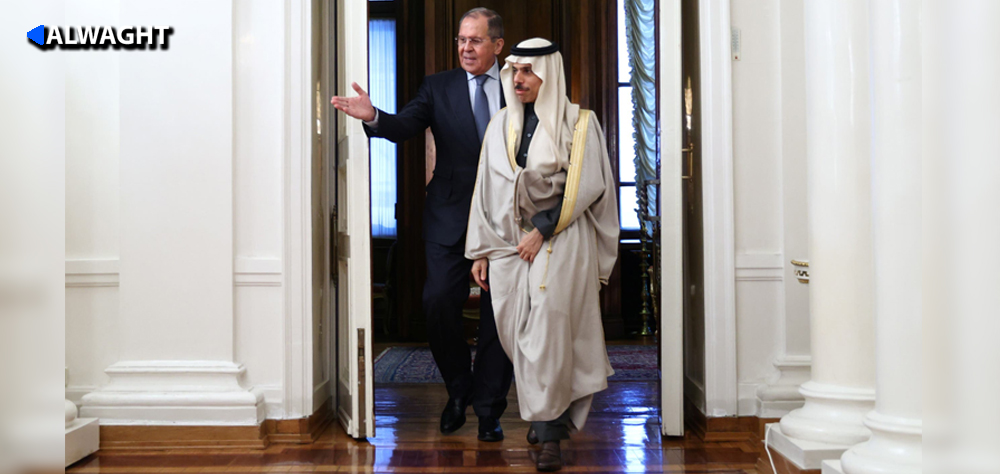Alwaght- On Thursday, Saudi Arabian Foreign Minister Faisal bin Farhan Al Saud visited Moscow in his first visit to Russia since being appointed to the post in October 2019.
The two sides discussed bilateral ties, energy, finance, and developments in West Asia and North Africa.
Energy discussions: Fossil to nuclear energy
One of the most important discussion topics between Saudi FM and his Russian counterpart Sergey Lavrov was energy. Russia and Saudi Arabia are key global oil producers and in recent years engaged in cooperation and coordination under OPEC Plus structure to manage prices and supplies as the strategic Commodity’s slumped in the global markets.
Saudi Arabia is opposed to an oil production increase and recently declared it would cut its daily output by 1 million barrels in February and March. This is while according to OPEC Plus agreement reached in December 2020, Russia and Kazakhstan can increase their output together by 75,000 barrels in February and the same amount in March– 65,000 barrels as Russian share and 10,000 barrels as Kazakh share.
Russian Deputy Prime Minister Alexander Novak, who represents his country at OPEC Plus meetings, called the surprise Saudi output cut a “new year gift” to the oil market.
Saudi Arabia tries to persuade the Russians to maintain the current output levels, something Moscow comes against. Novak, who is also the energy minister, reiterated Moscow's commitment to the agreements but said that his country was willing to increase the production gradually as allowed by the accord.
Following the news, the global oil markets reacted with a 5 percent increase. Brent Crude was sold $53 for a barrel. West Texas Intermediate oil reached $49. OPEC Plus is set to meet next in March to determine April output.
At a press conference, Lavrov said that we coordinate our moves with Saudi Arabia in the global hydrocarbons markets within the OPEC Plus framework which has a definite influence on the oil prices. The Saudi-Russian joint ministerial committee led by Prince Abdulaziz bin Salman and Novak watches the market landscapes.
Additionally, the Russian foreign ministry hoped that Moscow talks highlighted the empowering joint investment fund that has so far invested in joint projects $2.5 billion.
Another point of focus in the Moscow discussions was the nuclear ambitions of the kingdom that are seriously pursued under Crown Prince Mohammed bin Salman. Saudi Arabia’s nuclear program is at its initial stages and Riyadh plans to build 16 reactors in the next 20 years.
In 2017, the two countries reached an agreement on nuclear cooperation, according to which Rosatom announced that it would work with small and mid-size reactors that are used to produce power and also desalinate water. It also promised to train Saudi personnel to run nuclear plants.
Bin Salman’s nuclear ambitions have boiled over as the UAE built its nuclear plant. The de facto rule of the oil-wealthy monarchy hoped that during the Trump period, his country would gain Washington authorization for uranium enrichment. But this goal is harder now to realize as Trump leaves power and his successor would fear a nuclear race in the region.
But raising the nuclear cooperation with Russia comes to put strains on Washington, telling the Americans that if they do not work with Saudi Arabia on nuclear energy, the latter would turn head to other powers like Russia and China.
From another dimension, by raising the nuclear issue, Riyadh wants to send a message to Washington about its concerns on Iran's nuclear program. If these concerns are not met, Riyadh may seek nuclear arms.
Moreover, Farhan discussed cooperation to produce the coronavirus vaccine. Reports say that Saudi companies are considering to work on the third stage of the human trials of the Russian Sputnik V vaccine to domesticize it. This shows that despite the Western media blackening campaign against Russian vaccines and promotion of the American and British vaccines, even allies of the West seek to buy Russian vaccines as COVID-19 tolls are still high in the Western countries.
The difference in regional peace vision
The Saudi top diplomat’s visit follows last week's Arab reconciliation and clearly trip comes to mark the Riyadh movement to the post-détente atmosphere. So, regional cases was another discussion topic for the Saudi delegation in Russia. One important case is the regional peace and stability. But the remarks of the two sides showed how deep the two sides’ visions were.
At the press conference, FM Lavrov expressed interest to see the start of a dialogue between Iran and the Persian Gulf Arab neighbors to devise trust-building mechanisms between the two sides. The top Russian diplomat said that reaching that point was one of the objectives of the collective security Russia wants to see in the Persian Gulf.
At the same time, he accused the current US administration of setting up roadblocks in front of the Iranian-Arab dialogue. Actually, Russia supports the Iranian view on regional peace in which negotiations be conducted with neighbors without the intervention of the trans-regional powers and understands that the origin of the tensions is not Tehran but the Saudi leaders who want the US involvement in the regional issues.



























